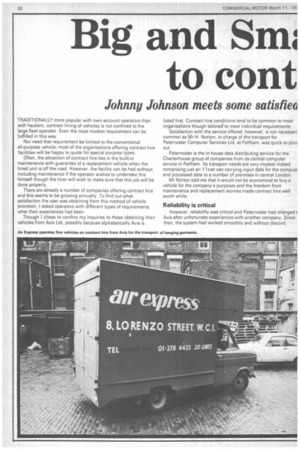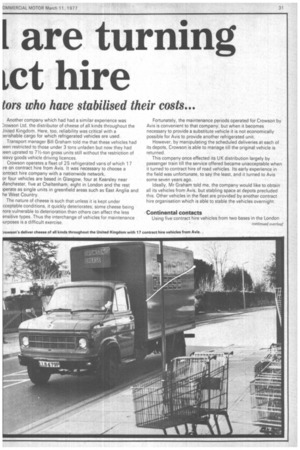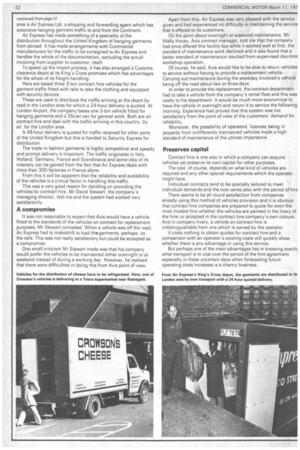Big and SIM
Page 34

Page 35

Page 36

If you've noticed an error in this article please click here to report it so we can fix it.
are turning to cont Lct hire
Johnny Johnson meets some satisfied tors who have stabilised their costs...
TRADITIONALLY more popular with own-account operators than with hauliers, contract hiring of vehicles is not confined to the large fleet operator. Even the most modest requirement can be fulfilled in this way.
Nor need that requirement be limited to the conventional all-purpose vehicle; most of the organisations offering contract hire 'facilities will be happy to quote for special purpose types Often, the attraction of contract hire lies in the built-in maintenance with guarantee of a replacement vehicle when the hired unit is off the road. However, the facility can be had without including maintenance if the operator wishes to undertake this himself though the hirer will wish to make sure that this job will be done properly.
There are already a number of companies offering contract hire and this seems to be growing annually. To find out what satisfaction the user was obtaining from this method of vehicle provision, I asked operators with different types of requirements what their experiences had been.
Though I chose to confine my inquiries to those obtaining their vehicles from Avis Ltd, possibly because alphabetically Avis is listed first.' Contract hire conditions tend to be common to most organisations though tailored to meet individual requirements.
Satisfaction with the service offered, however, is not necessari common as Mr H. Norton, in charge of the transport for Paternoster Computer Services Ltd, at Feltham, was quick to poin out.
Paternoster is the in-house data distributing service for the Charterhouse group of companies from its central computer service in Feltham. Its transport needs are very modest indeed comprising just an 1 lcwt van carrying input data for the compute and processed data to a number of premises in central London.
Mr Norton told me that it would not be economical to buy a vehicle for the company's purposes and the freedom from maintenance and replacement worries made contract hire well worth while.
Reliability is critical
However, reliability was critical and Paternoster had changed t Avis after unfortunate experiences with another company. Since then, the system had worked smoothly and without discord. Another company which had had a similar experience was :rowson Ltd, the distributor of cheese of all kinds throughout the Jnited Kingdom. Here, too, reliability was critical with a )erishable cargo for which refrigerated vehicles are used.
Transport manager Bill Graham told me that these vehicles had )een restricted to those under 3 tons unladen but now they had )een uprated to 71/2-ton gross units still without the restriction of leavy goods vehicle driving licences.
Crowson operates a fleet of 25 refrigerated vans of which 17 Ire on contract hire from Avis. It was necessary to choose a :ontract hire company with a nationwide network, or four vehicles are based in Glasgow, four at Kearsley near ilanchester, five at Cheltenham, eight in London and the rest iperate as single units in greenfield areas such as East Anglia and he West Country..
The nature of cheese is such that unless it is kept under cceptable conditions, it quickly deteriorates; some cheese being lore vulnerable to deterioration than others can affect the less ensitive types. Thus the interchange of vehicles for maintenance lurposes is a difficult exercise. Fortunately, the maintenance periods operated for Crowson by Avis is convenient to that company, but when it becomes necessary to provide a substitute vehicle it is not economically possible for Avis to provide another refrigerated unit.
However, by manipulating the scheduled deliveries at each of its depots, Crowson is able to manage till the original vehicle is returned.
This company once effected its UK distribution largely by passenger train till the service offered became unacceptable when it turned to contract hire of road vehicles. Its early experience in the field was unfortunate, to say the least, and it turned to Avis some seven years ago.
Ideally, Mr Graham told me, the company would like to obtain all its vehicles from Avis, but stabling space at depots precluded this. Other vehicles in the fleet are provided by another contract hire organisation which is able to stable the vehicles overnight.
Continental contacts
Using five contract hire vehicles from two bases in the London area is Air Express Ltd, a shipping and forwarding agent which has extensive hanging garment traffic to and from the Continent.
Air Express has made something of a speciality of the distribution throughout the United Kingdom of hanging garments from abroad. It has made arrangements with Continental manufacturers for the traffic to be consigned to Air Express and handles the whole of the documentation, excluding the actual invoicing from supplier to customer, itself.
To speed up the import process, it has also arranged a Customs clearance depot at its King's Cross premises which has advantages for the whole of its freight handling.
Here are based three 3-ton contract hire vehicles for the garment traffic fitted with rails to take the clothing and equipped with security devices.
These are used to distribute the traffic arriving at the depot by road in the London area for which a 24-hour delivery is quoted. At London Airport, the company bases one 3-ton vehicle fitted for hanging garments and a 35cwt van for general work. Both are on contract hire and deal with the traffic arriving in this country, by air, for the London area.
A 48-hour delivery is quoted for traffic received for other parts of the United Kingdom but this is handed to Security Express for distribution.
The trade in fashion garments is highly competitive and speedy and prompt delivery is important. The traffic originates in Italy, Holland, Germany, France and Scandinavia and some idea of its intensity can be gained from the fact that Air Express deals with more than 300 factories in France alone.
From this it will be apparent that the reliability and availability of the vehicles is a critical factor in handling this traffic.
This was a very good reason for deciding on providing the vehicles by contract hire, Mr David Stewart, the company's managing director, told me and the system had worked very satisfactorily.
A compromise It was not reasonable to expect that Avis would have a vehicle fitted to the standards of the vehicles on contract for replacement purposes, -Mr Stewart conceded. When a vehicle was off the road, Air Express had to makeshift to load the garments, perhaps, on the rails. This was not really satisfactory but could be accepted as a compromise.
• One small criticism Mr Stewart made was that his company would prefer the vehicles to be maintained either overnight or at weekend instead of during a working day. However, he realised that there were difficulties in doing this from Avis point of view. Apart from this, Air Express was very pleased with the service given and had experienced no difficulty in maintaining the service that it offered to its customers.
On the point about overnight or weekend maintenance, Mr Wally Hovey, Avis contract manager, told me that the company had once offered this facility but while it worked well at first, the standard of maintenance work declined and it was found that a better standard of maintenance resulted from supervised day-time workshop operation.
Of course, he said, Avis would like to be able to return vehicles to service without having to provide a replacement vehicle. Carrying out maintenance during the weekday involved a vehicle being off the road about two or three days.
In order to provide the replacement, the contract department had to take a vehicle from the company's rental fleet and this was costly to his department. It would be much more economical to have the vehicle in overnight and return it to service the following morning. Experience had proved that this system was not satisfactory from the point of view of the customers' demand for reliability.
Moreover, the possibility of operators' licences being in jeopardy from indifferently maintained vehicles made a high standard of maintenance of the utmost importance.
Preserves capital
Contract hire is one way in which a company can acquire vehicles yet preserve its own capital for other purposes.
The cost, of course, depends on what kind of vehicles are required and any other special requirements which the operator might have.
Individual contracts tend to be specially tailored to meet individual demands and the cost varies also with the period of hire There seems to be all round satisfaction from companies already using this method of vehicles provision and it is obvious that contract hire companies are prepared to quote for even the most modest hire whether the vehicles are painted in the livery of the hirer or accepted in the contract hire company's own colours. And in company livery, a vehicle on contract hire is indistinguishable from one which is owned by the operator.
It costs nothing to obtain quotes for contract hire and a comparison with an operator's existing costs will quickly show whether there is any advantage in using this service.
But perhaps one of the main advantages lies in knowing exact!) what transport is to cost over the period of the hire agreement especially in these uncertain days when forecasting future operating costs increases is a chancy business.






















































































































